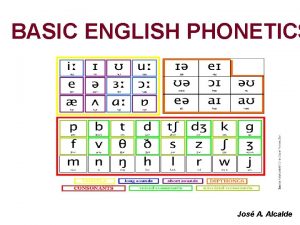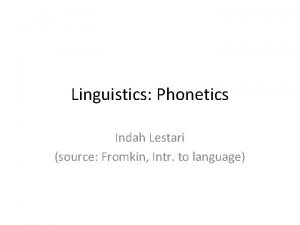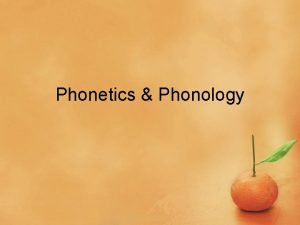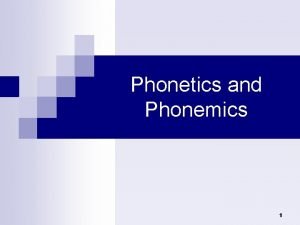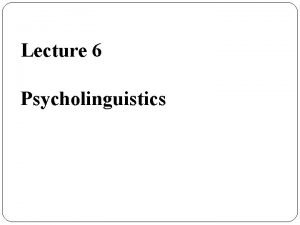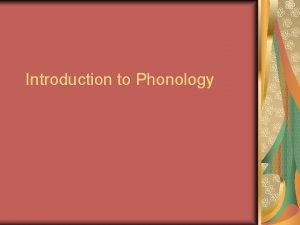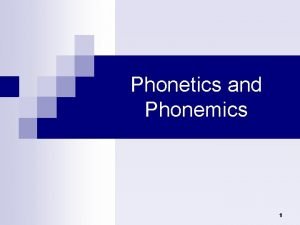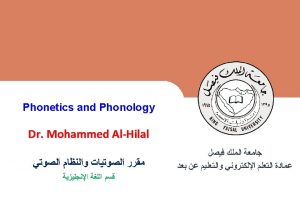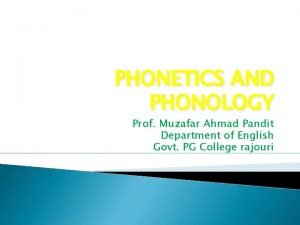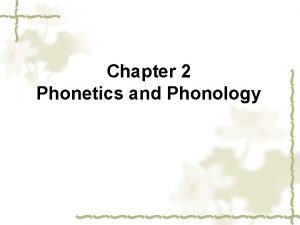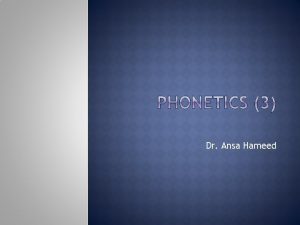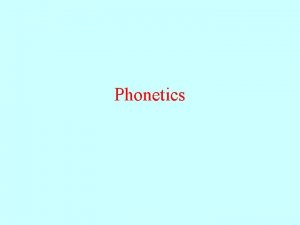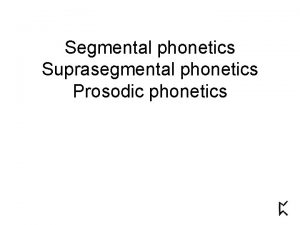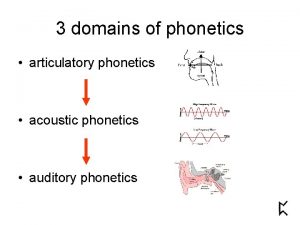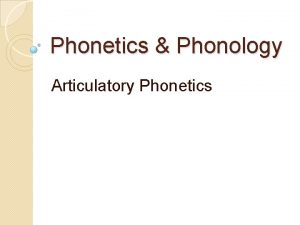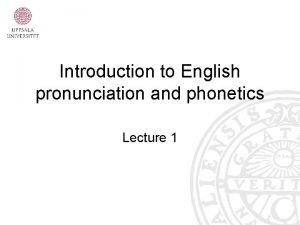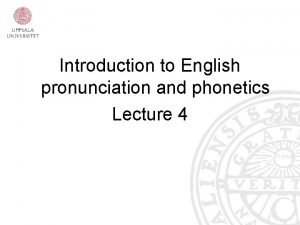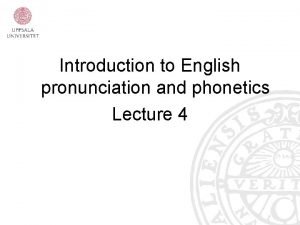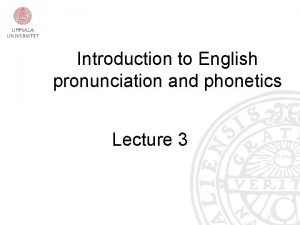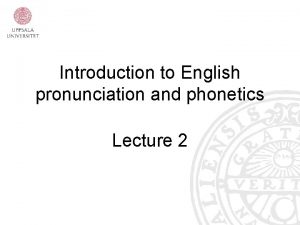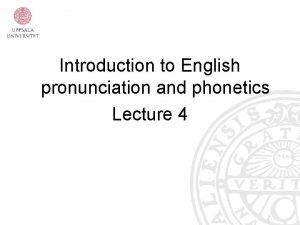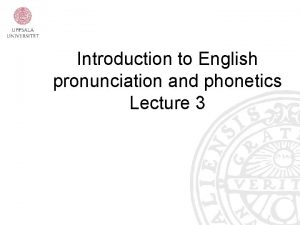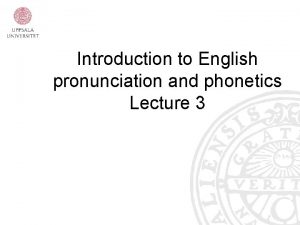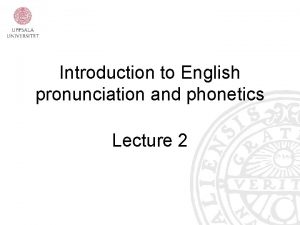Introduction to English pronunciation and phonetics Lecture 5

















- Slides: 17

Introduction to English pronunciation and phonetics Lecture 5

British and American English Two distinctive dialects: • Vocabulary (e. g. pavement - sidewalk) • Grammar (e. g. Have you eaten already? vs. Did you eat already? ) • Semantics (e. g. first floor, public school) • Spelling (e. g. colour - color) • Pronunciation

American English pronunciation • has its roots in English as it was spoken in Britain and Ireland in the 17 th and 18 th centuries • influenced especially by accents spoken in the southern parts of Britain Example: postvocalic /r/ as in ‘part’ Shakespearean English found in rural American accents?

• Noticeable historical traces in some parts of the US Example: New England lack of postvocalic /r/ as in ‘car’ and /j/ as in ‘news’ • Relatively few regional dialects in American English • Four main dialect areas: Eastern, Northern, Southern, Western

General American (GA) • an umbrella term used for neutral and commonly used US English • spoken by a majority of Americans in the Western and Middle states • Canadian English has many pronunciation similarities with GA, but is considered a separate variety

RP – GA different vowel sounds • GA vowels often slightly longer (e. g. ’cat’) • GA often has less vowel reduction and more noticeable pronunciation of schwa /ə/ (e. g. ’candle’) • RP /ɑ: / — GA /æ/ especially before /s, f, θ/ ‘glass, laugh, bath’ and –nce, -nt: ‘dance, can’t’ always /ɑ: / before /r/: ‘car, large, heart’

• Only three clear diphthongs in GA /aı/ time /ɔı/ toy /aʊ/ house (‘hair, here, hay’ = weak or monophthongs) • RP /ʌ/ — GA /ɜ: / ‘worry, courage, hurry’ • RP /ɒ/ — GA /ɑ: / ; /ɔ: / ‘holiday, want, bomb ; gone, coffee’

Different consonant sounds In GA, but not in RP: • /r/ is pronounced in all positions • /l/ is more or less dark in all positions

• /t/ is voiced before unstressed syllable (called voiced flap /D/): ‘later, better, city’ (but not in e. g. ‘contain’, ‘between’) latter – ladder writer – rider metal – medal • ‘wh’ is often pronounced /hw/ in question words • only /u: / after especially /t, n, d/ where RP has /ju: /; e. g. ’student, news, due’

Different pronunciations Many individual pronunciation differences: RP GA ate /et || eıt / /eıD/ pasta /'pæstə/ /'pɑ: stə/ vitamin /'vıtəmın/ /'vaıDəmın/ tomato /tə'mɑ: təʊ/ /tə'meıDoʊ/ progress /'prəʊgres/ /'prɑ: grəs/ either/neither /'aıðə/ /'i: ðər/

Different word stress • primary stress earlier in GA than in RP in some words RP address donate research GA address donate research

Different word stress • primary stress later in GA than in RP in some French loanwords RP garage café ballet brochure GA garage café ballet brochure

Vowel reduction differences • In some words with suffixes, the vowel in the suffix is less reduced in GA than in RP Examples: cemetery category ceremony dictionary

Recap of lectures • • RP and GA The phonetic alphabet (IPA) Monophthongs (front-back; open-close) Diphthongs (closing-centring) Consonants (voiced-voiceless) Plosives, fricatives, affricates, nasals Focus on sounds not existing in Swedish

Recap of lectures • • • Sounds in context Word stress Assimilation and elision Reduced unstressed syllables Strong and weak forms GA and RP – major differences

Written exam • part of the A 1/HS 1/T 1 language structure exam • 20 multiple choice questions • roughly proportioned according to the time given to the subject areas in the lectures • example exam in the language structure compendium

Written exam • Lectures and Power. Point slides • Language structure compendium • Study questions in Rönnerdal and Johansson (pp. 129 -134) • Go to the language lab!
 Introduction to general phonetics and phonology
Introduction to general phonetics and phonology Alcalde pronunciation
Alcalde pronunciation Branches of phonetics
Branches of phonetics 01:640:244 lecture notes - lecture 15: plat, idah, farad
01:640:244 lecture notes - lecture 15: plat, idah, farad Phonetics and phonology
Phonetics and phonology Differences between phonetics and phonology
Differences between phonetics and phonology Phonology questions
Phonology questions Phonetics and phonology
Phonetics and phonology A concise introduction to linguistics
A concise introduction to linguistics Phonetically pronunciation
Phonetically pronunciation Working memory
Working memory Phonology
Phonology N phonetics
N phonetics What is the difference between phonetics and phonology
What is the difference between phonetics and phonology What is the difference between phonetics and phonology
What is the difference between phonetics and phonology Phonetics and phonology
Phonetics and phonology English literature lecture
English literature lecture English language lecture
English language lecture

